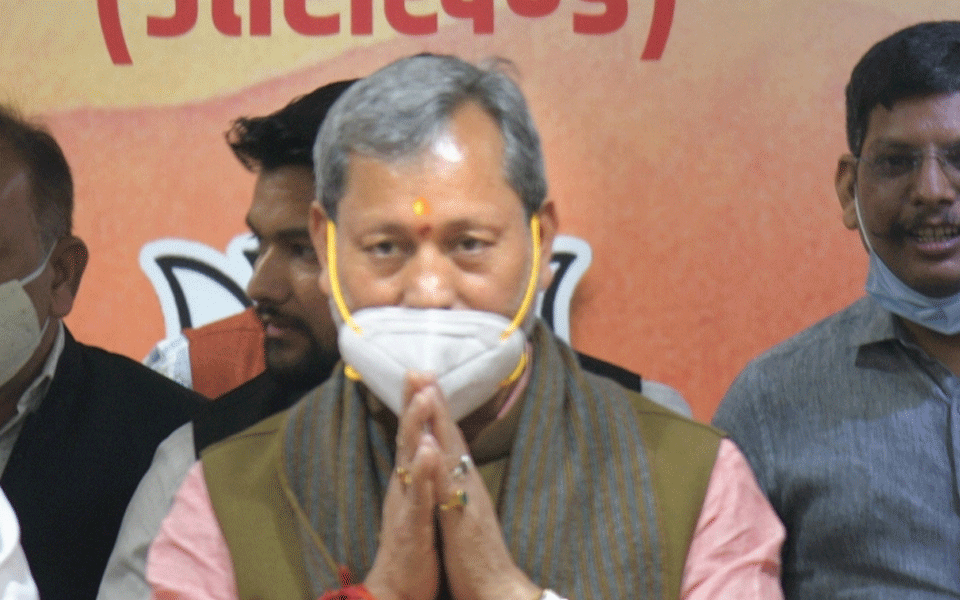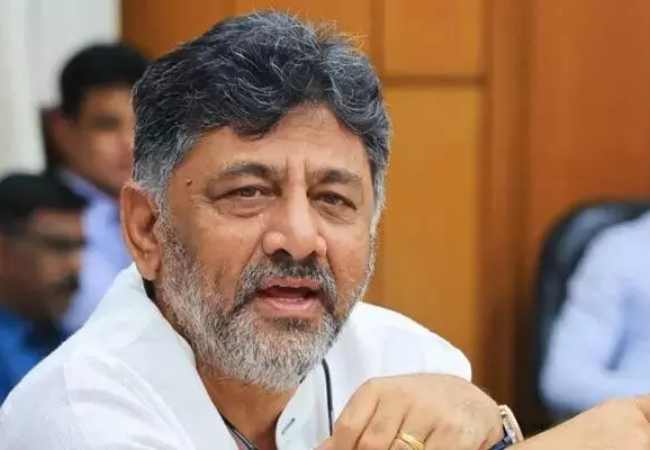Dehradun: BJP leader Tirath Singh Rawat resigned as Uttarakhand chief minister on Friday after holding the post for less than four months.
Ending days of speculation about a change of guard in the state, Rawat handed over his resignation letter to Governor Baby Rani Maurya past 11 pm, hours after returning from Delhi where he was summoned by the top BJP leadership on Wednesday.
Rawat was accompanied by his ministerial colleagues, including Subodh Uniyal and Ganesh Joshi, when he went to the Raj Bhawan.
The Uttarakhand BJP legislature party will meet on Saturday to elect its new leader, who will be later sworn in as the next chief minister of the state where assembly elections are due early next year.
Tirath Singh Rawat had replaced Trivendra Singh Rawat on March 10 after he was similarly asked by the party to step down.
Interacting with reporters at his official residence after returning from the Raj Bhawan, Tirath Singh Rawat said he had submitted his resignation to the governor.
"I thought it was appropriate to resign as the state was facing a constitutional crisis under the provisions of section 151 A and 164 of the Representation of People Act," he said.
The Constitution required Rawat, who is an MP from Pauri Garhwal, to get elected as a member of the state assembly within six months of his induction as the chief minister.
But there seemed an increasing uncertainty over the election commission holding bypolls for the two seats in the state when there is less than a year to go for the assembly elections.
"I want to thank the party leadership, including Prime Minister Narendra Modi, Home Minister Amit Shah and BJP president J P Nadda, and a host of other senior leaders for assigning me key responsibilities as the state unit president, a Lok Sabha MP and the chief minister of the state."
When reporters told him that the constitutional crisis could have been avoided if he had contested from Salt in a bypoll held in April, Rawat said he could not do so as he had tested Covid positive at the time.
The BJP legislature party will hold a meeting at the party headquarters here at 3 pm on Saturday to elect its new leader, state BJP chief Madan Kaushik said.
All party MLAs have been asked to attend the meeting. Central observers and the party's in-charge for Uttarakhand will also be present, he said.
The new leader will most probably be from among the MLAs as holding a bypoll now is impossible.
Though the BJP has a penchant for springing surprises, the names of former chief minister Trivendra Singh Rawat, Chaubattakhal MLA and Cabinet Minister Satpal Maharaj and Shrinanagar MLA Dhan Singh Rawat have been doing the rounds as probables for the top post.
Tirath Singh Rawat had emerged as the surprise choice of the party for the top job belying all speculation when Trivendra Singh Rawat was replaced in March this year.
Trivendra Singh Rawat's name has been recommended by a section of party leaders who feel there is less than a year to go for the next assembly polls and instead of gambling on a new candidate it will be safe to reinstate Trivendra Singh Rawat as he has the experience of being at the helm.
Earlier, Chief Minister Tirath Singh Rawat held a press conference at the state secretariat here soon after his return from Delhi.
However, contrary to expectations he did not say anything about the speculation about a change of guard in the state and confined himself to talking only about steps taken by his government to give relief to different sectors hit badly by the Covid pandemic.
Around Rs 2,000 crore will be given to different sectors as a relief. Recruitment to around 22,340 posts in different sectors will be made directly, he said.
Rawat said that he wanted to make these announcements earlier but could not do so because of his sudden visit to Delhi.
Let the Truth be known. If you read VB and like VB, please be a VB Supporter and Help us deliver the Truth to one and all.
Bengaluru (PTI): Karnataka has proposed a new Information Technology Policy for 2025–2030, offering extensive financial and non-financial incentives aimed at accelerating investments, strengthening innovation and expanding the state's tech footprint beyond Bengaluru.
The Karnataka Cabinet gave its nod to the policy 2025–2030 with an outlay of Rs 445.50 crore on Thursday after the Finance Department accorded its approval.
The policy introduces 16 incentives across five enabler categories, nine of which are entirely new, with a distinctive push to support companies setting up or expanding in emerging cities.
Alongside financial support, the government is also offering labour-law relaxations, round-the-clock operational permissions and industry-ready human capital programmes to make Karnataka a globally competitive 'AI-native' destination.
According to the policy, units located outside Bengaluru will gain access to a wide suite of benefits, including research and development and IP creation incentives, internship reimbursements, talent relocation support and recruitment assistance.
The benefits also include EPF reimbursement, faculty development support, rental assistance, certification subsidies, electricity tariff rebates, property tax reimbursement, telecom infrastructure support, and assistance for events and conferences.
Bengaluru Urban will receive a focused set of six research and development and talent-oriented incentives, while Indian Global Capability Centres (GCCs) operating in the state will be brought under the incentive net.
Incentive caps and eligibility thresholds have been raised, and the policy prioritises growth-focused investments for both new and expanding units.
Beyond incentives, the government focuses on infrastructure and innovation interventions.
A flagship proposal in the policy is the creation of Techniverse -- integrated, technology-enabled enclaves developed through a public-private partnership model inside future Global Innovation Districts.
These campuses will offer plug-and-play facilities, artificial intelligence and machine learning and cybersecurity labs, advanced testbeds, experience centres, and disaster-resistant command centres.
There will also be a Statewide Digital Hub Grid and a Global Test Bed Infrastructure Network, linking public and private research and development, and innovation facilities across Karnataka.
The government has proposed a Women Global Tech Missions Fellowship for 1,000 mid-career women technologists, an IT Talent Return Programme to absorb experienced professionals returning from abroad, and broad-based skill and faculty development reimbursements.
Shared corporate transport routes in Bengaluru and tier-two cities will be designed with Bengaluru Metropolitan Transport Corporation and other transport entities to support worker mobility.
The government said the policy is the outcome of an extensive research and consultation process involving TCS, Infosys, Wipro, IBM, HCL, Tech Mahindra, Cognizant, HP, Google, Accenture and NASSCOM, along with sector experts and stakeholder groups.
It estimates an outlay of Rs 967.12 crore over five years, comprising Rs 754.62 crore for incentives and Rs 212.50 crore for interventions such as Techniverse campuses, digital grid development, global outreach missions and talent programmes.





